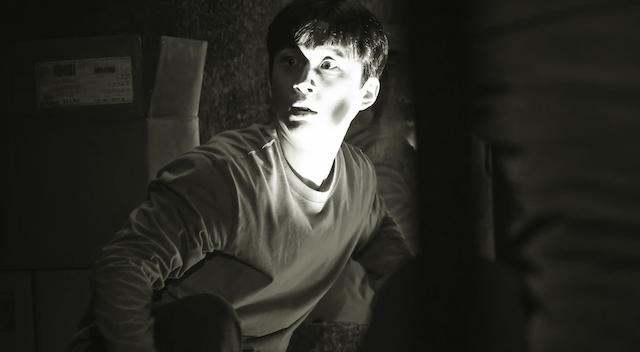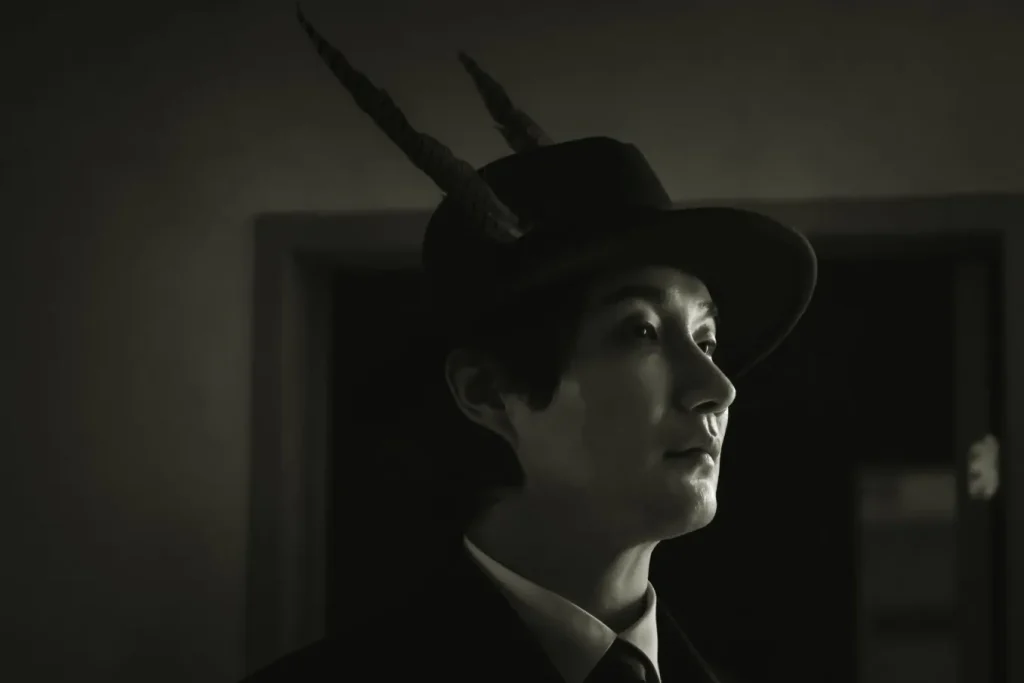
©Courtesy of Fantasia International Film Festival
New Yorkers might not even consider this near-future Korean metropolis (a sort of, but not exactly Seoul) a strange and unfamiliar urban dystopia, as director-screenwriter Yoon Eun-kyung intended. Yes, the air quality is awful and it is nearly impossible to find an affordable, livable apartment, thanks a bizarre and seemingly counter-productive tangle of tenancy regulations—but that kind of reminds us of home. Kim Shin-dong dearly yearns to move to the supposed domed-city paradise of Sphere-2 (if it even exists), but he still dreads losing his current one-bedroom shoebox apartment. Consequently, Kim takes desperate legal measures to forestall eviction, but they inevitably boomerang back on him in Yoon’s The Tenants, which had its Canadian premiere at the 2024 Fantasia International Film Festival.
After his adolescent landlord announced his intention not to renew Kim’s lease, the desperate worker-drone adopts a scorched-earth strategy without fully understanding the risks. He sublets to a “Wolwolse” tenant, who starts living in Kim’s bathroom, with his weirdly uncommunicative wife. Kim assumed they would want the living room, but they had their reasons for preferring his lavatory.
Having a Wolwolse tenant enormously complicates his landlord’s eviction plans. Indeed, the law intentionally favors such unconventional subtenants. Of course, they soon cause Kim plenty of annoyance as well, beyond his new reliance on his company’s shower-room facilities.
Frankly, Kim should have known better, because the unnamed “Wolwolse Man” acts suspiciously right from the start. Perhaps the way his eccentric alpine cap, with its two long feather-plumes, symbolically suggests a devil’s horns was an ill omen. Regardless, his subtenant constantly manipulates and intimidates Kim, both physically and psychologically. Sometimes his wife is even creepier. Not surprisingly, Kim finds it maddeningly difficult to extricate himself from the Faustian bargain he foolishly agreed to.

©Courtesy of Fantasia International Film Festival
Clearly, Yoon drew inspiration from a lot of dystopian and absurdist films, including Brazil and Naked Lunch. Yet, New Yorkers will find the insane logic of the Wolwolse system all too believable. Are we seeing a snapshot of our future here? Regardless, Yoon absolutely shreds the dystopia’s perverse urban planning policies and the counter-productive preferential treatment it bestows on the marginalized castes of Kafkaesque subtenants, in extreme and irrational ways that would be spoilery to spell out. Frankly, libertarian think tanks ought to program screenings of The Tenants.
Heo Dong-won drives the film with his sinister, yet strangely laidback performance as the Wolwolse man. He truly radiates bad vibes and seems to enjoy tormenting Kim. Likewise, Park So-hyun portrays the Wolwolse woman as both disturbingly passive and uncomfortably odd. You cannot help feeling bad for Kim, even though there is more of an edge to him than the typical Orwellian Winston Smith analog. Nevertheless, actor Kim Dae-gun makes his cluelessness almost painful to watch.
Few films ever looked as profoundly dystopian as The Tenants, while presumably adhering to a strict budget constraint. The deliberately drab (mostly) black-and-white cinematography perfectly suits the story. The Spartan sets and brutalist architecture also further enhance the atmosphere of depression. The elements of scientific speculation are minimal, especially those seen on screen. However, there is a great deal of dystopian world building that is politically or sociologically speculative in nature. Arguably, the central events of the film could happen in the world of today—and they might just yet.
The final revelations are relatively easy to anticipate, but in most other respects, Yoon’s writing is remarkably sharp. Regardless of her intentions, her satire cuts both ways ideologically. That is often the case with lasting art and cinema (whereas propaganda has a short expiration date). In this case, The Tenants deserves a long life, to allow cineastes to fully absorb and debate it, following its Fantasia screenings.
Grade: A-
If you like the review, share your thoughts below!

